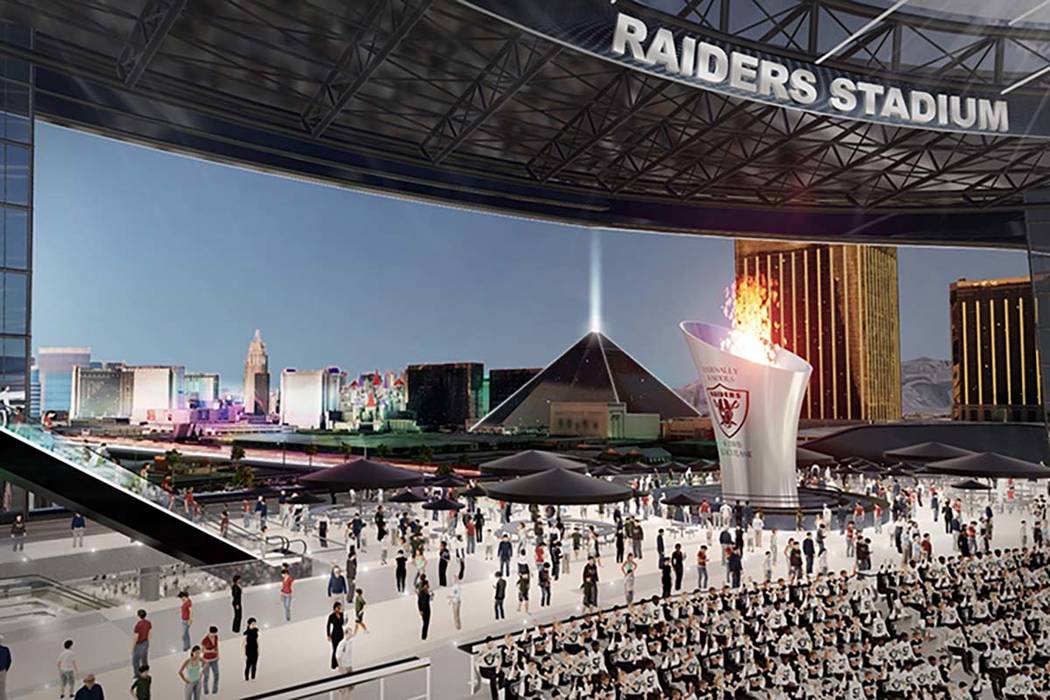Details of lease agreement between Las Vegas officials, Raiders emerging
More details of a proposed lease agreement between the Las Vegas Stadium Authority and the Oakland Raiders are expected to emerge Thursday when the 11-member board meets.
But the board hasn’t scheduled a vote on a lease at the meeting, the last scheduled board gathering before the Raiders take their relocation request to NFL owners March 26-29 in Phoenix.
Thursday’s meeting at the Clark County Government Center is more likely to be informational with few decisions reached.
Jeremy Aguero, principal for Applied Analysis, the stadium authority’s contracted staff, said Mark Arnold of the Houston-based Andrews Kurth Kenyon law firm, the lead attorney for the authority, will brief the board on the lease negotiations.
Aguero said Arnold has been meeting with the Raiders’ outside counsel, the Philadelphia-based Morgan Lewis law firm, and that about 75 percent of the contract involves issues both sides have agreed upon. The remaining 25 percent of the deal is open to discussion, Aguero said. Many of those issues involve UNLV’s access to and use of the facility, one of the key factors in the Nevada Legislature’s approval of a hotel room tax increase to help finance the stadium.
The Las Vegas stadium — a proposed $1.9 billion, 65,000-seat domed facility — would be one of the few NFL venues to regularly schedule college games on its field.
STADIUM MISPERCEPTIONS
Aguero said the board also would receive an update on common misperceptions about the stadium deal, first brought to light in January when the Raiders presented a proposed lease agreement that included paying $1 annual rent.
Since that meeting, Aguero and board Chairman Steve Hill have emphasized that the authority can’t accept fees or payments from a stadium tenant because of the tax-exempt status of the $750 million in bonds Clark County will sell to finance stadium construction.
The confusion over the deal prompted Aguero to issue a memorandum to the the authority board in late January.
“I believe it is worth reiterating that because the (Las Vegas Stadium Authority) will not receive any rental revenue and because the development partners and the stadium events company are solely responsible for all development and operating cost overruns, the rental rate provided in the draft stadium use agreement and highlighted in media accounts is not a meaningful consideration,” Aguero said in the memo.
Aguero also noted that if the stadium is built, the first $100 million of costs, excluding land acquisition, would be paid by the stadium developer — presumably the Raiders. The next payments would be made through the county bonds “except that the last $50 million of project cost is to be paid by the public after the private developer has funded 100 percent of its share of the project costs.”
OTHER BENEFITS
The city’s return on the public’s investment won’t come from rent payments and revenue sharing, according to the board.
State officials are banking on increased economic activity, new jobs, increased local wages and increased tax revenue that would not exist without the stadium. They expect room, gaming, sales and entertainment tax revenue to climb once the stadium is operating.
They also note that the stadium eliminates the need to build a new college facility for UNLV and that it will provide a large entertainment venue to house concerts and special events too large for existing Las Vegas facilities.
Legislation authorizes stadium construction to occur as soon as the NFL approves a team in Las Vegas.
The Raiders’ disclosure to NFL owners Monday that Bank of America would provide a $650 million loan toward the stadium’s construction clears the path to a relocation vote, which would trigger finalization of the stadium site and start design for construction.
The Raiders will pay $500 million in stadium construction costs. Bank of America’s involvement in the stadium would fill a $650 million funding hole created when the family of Las Vegas Sands Corp. Chairman and CEO Sheldon Adelson and Goldman Sachs withdrew from the deal in January.
The Review-Journal is owned by the family of Las Vegas Sands Corp. Chairman and CEO Sheldon Adelson.
Contact Richard N. Velotta at rvelotta@reviewjournal.com or 702-477-3893. Follow @RickVelotta on Twitter.
RELATED
Raiders' Las Vegas stadium gets boost from Bank of America
Rent not always key indicator of NFL stadium deals
Las Vegas still leads the pack in pursuit of Raiders
Las Vegas Stadium Authority should beware potential Raiders escape clause, expert says























